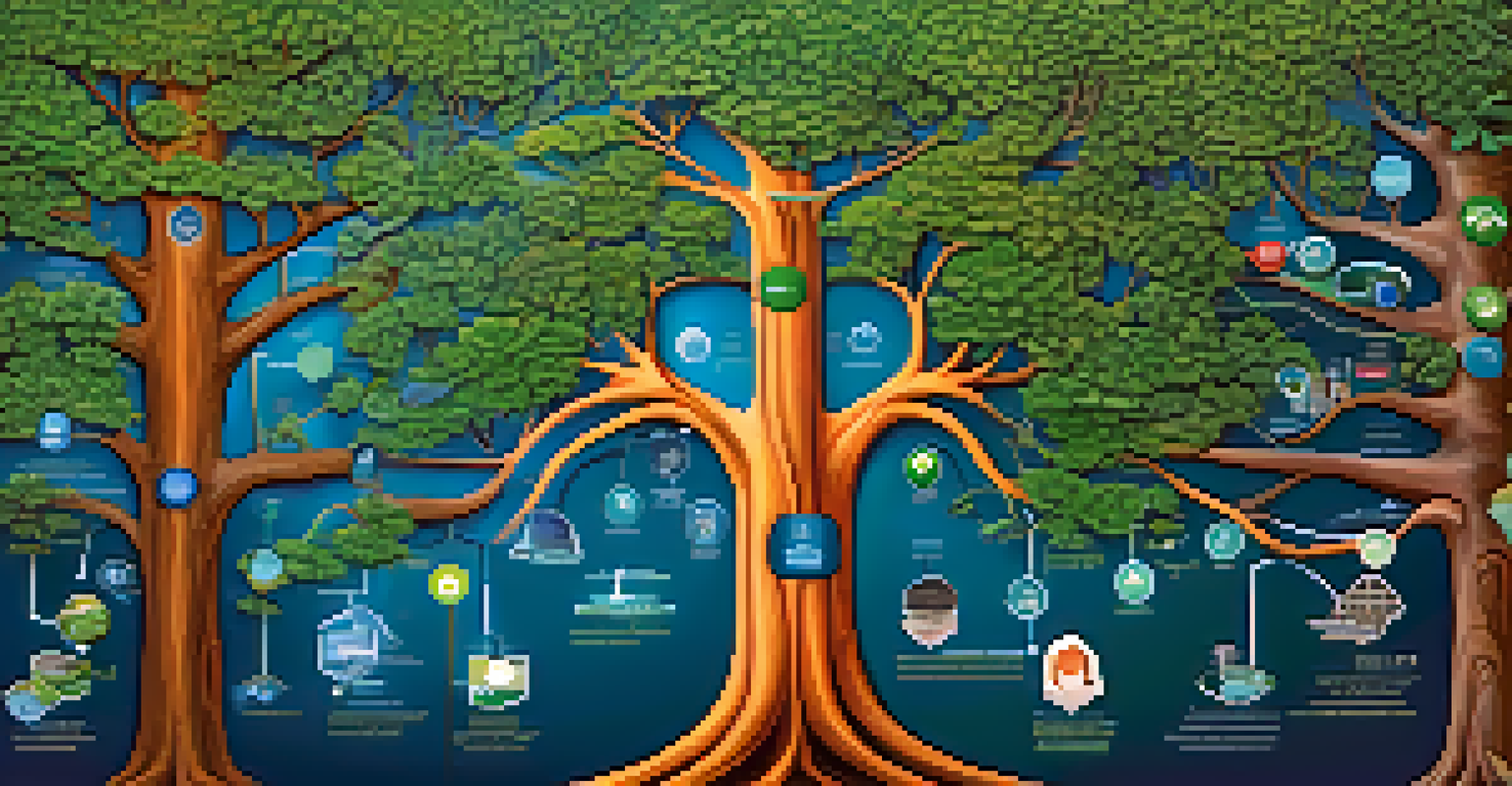The Role of Career Assessments in Career Planning

What Are Career Assessments and Their Purpose?
Career assessments are tools designed to help individuals understand their interests, skills, and values in relation to various career paths. They come in various forms, including questionnaires, tests, and interviews. The primary purpose is to provide insights that can guide decision-making, making the often overwhelming process of career planning more manageable.
The only way to do great work is to love what you do.
These assessments can reveal patterns in your personality and preferences, helping to identify careers that might be a good fit. For example, someone who enjoys problem-solving might be steered toward engineering or data analysis. Ultimately, they serve as a starting point for deeper exploration into potential career options.
Understanding your strengths and weaknesses through these assessments can empower you to take control of your career journey. Instead of wandering aimlessly through job listings, you can focus on opportunities that align with your intrinsic motivations and capabilities.
Types of Career Assessments Available
Career assessments come in various types, each serving a unique purpose. Some popular formats include personality assessments like the Myers-Briggs Type Indicator (MBTI) and skills assessments that evaluate your competencies in specific areas. Others may focus on interests, such as the Holland Code, which aligns your preferences with career options.

Each type of assessment offers different insights, allowing you to approach your career planning from multiple angles. For instance, a personality test may reveal that you're an extrovert, suggesting roles in sales or public relations, while a skills assessment might highlight your proficiency in coding, leading you toward tech careers.
Career Assessments Guide Decisions
These tools help individuals understand their interests, skills, and values, making career planning easier.
By utilizing a combination of these assessments, you can gain a well-rounded view of your career potential. This holistic approach can uncover paths you might not have considered, ensuring you don’t miss out on opportunities that truly resonate with you.
Benefits of Career Assessments in Career Planning
One of the key benefits of career assessments is that they can save you time and effort in your job search. By identifying your strengths and preferences early on, you can target roles that are more likely to fulfill you. This focused approach reduces the frustration that often comes with applying for jobs that aren't a good match.
Knowing yourself is the beginning of all wisdom.
Additionally, career assessments can boost your confidence by providing validation of your skills and interests. Knowing that you have the potential to succeed in a particular field can inspire you to pursue it with enthusiasm. For example, if an assessment indicates you have a strong aptitude for leadership, you might feel more inclined to seek out management roles.
Furthermore, these assessments can serve as a useful tool in career development discussions with mentors or career coaches. They provide a shared language for exploring your goals and aspirations, making it easier to create actionable plans for your future.
How to Choose the Right Career Assessment
Choosing the right career assessment can be a daunting task due to the multitude of options available. Start by considering what specific insights you're seeking. Are you looking to understand your personality type, assess your skills, or identify your interests? Having clear goals in mind will help you select the most relevant assessment.
Researching reputable sources is also essential. Look for assessments that are widely recognized and have been validated through research. Websites of career counseling organizations or educational institutions often provide reliable assessments. For example, the Strong Interest Inventory is a respected tool for exploring interests in relation to careers.
Types of Assessments Available
Various assessments, like personality and skills tests, provide different insights to aid in career exploration.
Lastly, consider combining different types of assessments for a comprehensive view. By using a personality test alongside a skills assessment, you can gain deeper insights that inform your career planning process. This multifaceted approach will enhance your understanding of where you fit in the workforce.
Interpreting Your Assessment Results Effectively
Interpreting the results of your career assessments can sometimes feel overwhelming, but it’s important to remember that these insights are just one piece of the puzzle. Take the time to digest what the results mean in the context of your experiences and aspirations. For instance, if your assessment suggests you excel in analytical thinking, reflect on past experiences where you've demonstrated this skill.
It's also beneficial to discuss your results with a career counselor or mentor. They can provide additional context and help you translate your findings into actionable steps. This collaborative approach can lead to deeper insights, ensuring you don't overlook important aspects of your career potential.
Keep in mind that assessment results are not set in stone. They are meant to guide you, not dictate your future. As you gain more experiences and evolve personally and professionally, your interests and skills may change, so be open to revisiting assessments periodically.
Common Misconceptions About Career Assessments
One common misconception is that career assessments will give you a definitive answer about what career to pursue. In reality, they are designed to provide guidance rather than concrete decisions. Think of them as a compass that points you in the right direction, but ultimately, you’re the one who decides the path you take.
Another misunderstanding is the belief that assessments are only for people who are unsure about their careers. In fact, even those who feel confident in their career path can benefit from assessments. For instance, they can uncover hidden strengths or suggest new avenues for growth that you may not have considered.
Interpreting Results is Key
Understanding assessment results in context and discussing them with mentors can lead to actionable career steps.
Lastly, many people think that the results of an assessment are absolute. However, it's crucial to remember that personal growth and career evolution are ongoing processes. Regularly revisiting your assessments can provide fresh insights that align with your current goals and circumstances.
Integrating Career Assessments into Your Career Plan
Integrating career assessments into your overall career plan can enhance your decision-making process. Start by setting clear career goals based on your assessment results. For example, if your assessment indicates a strong interest in social work, outline the steps needed to pursue that career, such as education or volunteer opportunities.
Next, use the insights gained from your assessments to inform your job search. Tailor your resume and cover letter to highlight the skills and interests that align with the positions you're applying for. This targeted approach can make your applications more compelling to potential employers.

Finally, remember that career planning is not a one-time event but an ongoing journey. As you gain new experiences and insights, revisit your career assessments regularly to adjust your plans accordingly. This adaptability is key to navigating the ever-changing landscape of the job market.